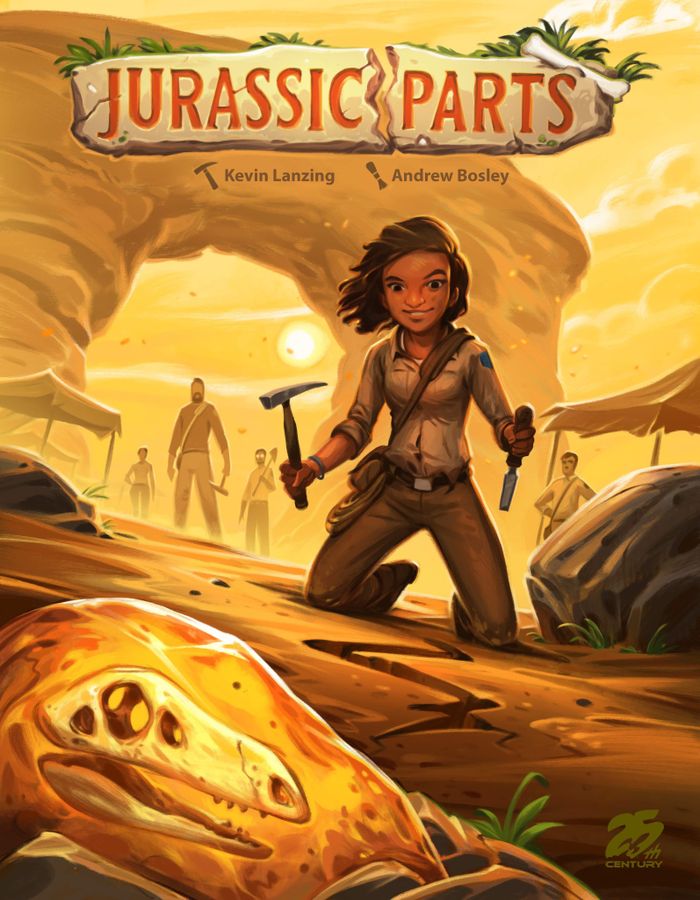Kickstart This! #170: Jurassic Parts

Designer: Kevin Lanzig (Flash Point, Flash Point: Fire Rescue, Tako Judo)
Artists: Andrew Bosley (Blood Bowl: Team Manager – The Card Game, Citadels, Everdell, Mission: Red Planet 2nd Edition, Tapestry), Crimzon Studio (Lab Wars, Overlords of Infamy, The Spoils), Matt Paquette (Call to Adventure, Mystic Vale, Thunderstone Quest, Tiny Towns)
Publisher: 25th Century Games (Christmas Lights: A Card Game, Space Explorers)
Genre/Mechanisms: area majority/influence, set collection
Funding Status: At the time of this posting, Jurassic Parts is already fully-funded. Pledges currently total more than 2x the initial funding goal, with 6 days to go on the campaign.
Player Count: 2-4
Solo Mode: no
Complexity: light
Risk: medium-high
What It’s About: “A light area enclosure and set collection tile game featuring dinosaur fossils.”
How It Works: “Jurassic Parts is a game of area control for 2-4 players. All players have access to the same slab of rock. The goal is to split it apart and claim complete dinosaur skeletons.”
“On a player’s turn they will move three Chisels of their color from the Dull side of the player board to the Sharp side. If this is not possible (ie: there are not enough dull Chisels to sharpen), they move what they can and draw the remainder.”
“Sharp Chisels may be played to the Field. Any space between two Fossil cards is a valid space to play a Chisel. Spaces beside only one Fossil (i.e. the edge of the Field slab) are not valid spaces. When a Chisel is played to the Slab, it becomes a crack. As cracks accumulate, the Field moves closer to breaking into two pieces. When, where, and how the Field breaks determines who gets which Fossils, and how many. Chisels are played one at a time. Should a break occur, you must resolve the break before continuing to place more Chisels onto the Field.”
Chisels can also be used to break apart Rocks. “The sides of each Fossil card may contain Rocks. This is hard terrain that is especially difficult to crack. Each Rock dulls one Sharp Chisel before the last Chisel can be played to the space.” To sum up, one Sharp Chisel is required for a crack with no Rocks; two for a crack with Rocks on one side; and three for a crack with Rocks on both sides.
“One Chisel may remain sharpened between turns. The remainder must be spent.”
Players may also Conduct Transactions with the Field Leader on their turn. This requires 1 Amber for the first purchase, 2 for the second, and 3 for the third. Transactions include being able to ignore any Rocks on the next 2 Chisel placements, sharpening 2 additional Chisels, taking any fossil from the Field excluding the Bone Pile or a fossil that would cause a split, and taking any fossil from the Field Leader.
Play then rotates to the next player in turn order, and continues until the Field is Empty. Whenever the Field is split completely into two separate pieces, the smaller half is broken down and divided among the contributing players. The player who contributed the most Chisels to the split takes half of the Fossils, rounded up. The player who contributed the next-highest amount of Chisels takes half of the remaining Fossils, rounded up. And so on. Once the final player who contributed Chisels takes their half, rounded upward, any remaining Fossils are given to the Field Leader. Any Chisels now residing on the edge of the board (and not between two tiles) are returned to their owners.
Whenever a player completes a Dinosaur on their turn, they receive 1 Amber from the Field Leader, and score points based on the number of Fossil tiles making up the Dinosaur, according to this scale: 1 point for a 1-Fossil Dinosaur, 3 for 2, 5 for 3, 8 for 4, 11 for 5, 15 for 6, 20 for 7, and 26 points for an 8-Fossil Dinosaur. Once all of the Field tiles have been removed from the game, players score any remaining Dinosaurs or Plants by the same sliding scale. Unspent Amber are worth 1 point each, as are Fossil Tiles making up incomplete Dinosaurs. The player with the most points wins.
Comparisons: The most obvious comparison is Fossilis, which ran on Kickstarter back in November. While both games are on the lighter side, Fossilis has a lot more plastic, and a lot more going into its component design. If you just like Dinosaurs, there’s Dinosaur Island, DinoGenics, Dominant Species, and the Apex Theropod Deck-Building Game to choose from. If you’re simply interested in games that pair area majority/influence with set collection, there’s Endeavor: Age of Sail, Rising Sun, Spirit Island, and Tigris & Euphrates, to name but a few.
What Should I Pledge?:
$29 Paleontologist: the game with all applicable stretch goals.
Add-Ons:
None.
KS Exclusives
None.
All-In Total: In the continental U.S., you’re looking at $29 for the Paleontologist pledge plus $7 in shipping for a total of $36.
Jurassic Parts completes its Kickstarter on Wednesday, February 12th and tentatively ships in July 2020.